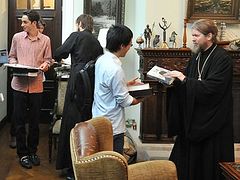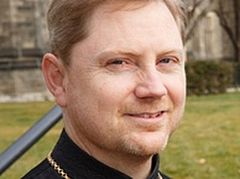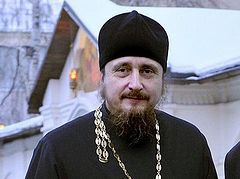The famous Eton College is a private British school for boys age thirteen to eighteen. The college is located thirty kilometers from London, not far from Royal Windsor Palace. It was founded in 1440 by King Henry VI.
Over its 600 years of existence the college has educated a large number of famous scholars, scientists, writers, and politicians. Robert Boyle, physicist, chemist, and author of the famous Boyle’s law was an Eton graduate; The famous polar explorer Lawrence Oates; John Gurdon, Nobel Laureate in medicine for stem cell research; writers Aldous Huxley and George Orwell; as well as twenty prime ministers of Great Britain
At the end of the August, eleven students of Eton College came to Russia on an unofficial visit, spending time in Moscow and St. Petersburg.
In Moscow the Etonians were received by Sretensky Monastery and Sretensky Theological Seminary. The British students met with Father Superior of the monastery and Rector of the Seminary Bishop Tikhon (Shevkunov) of Egorievsk, along with brothers of the monastery and seminarian of their age. The students talked about much. The undergraduate and graduate students of Sretensky Seminary, many of whom also hold secular university degrees, were especially interested to hear about how education is organized at Eton. Here is how the Etonians answers our questions.
Excelling in extracurricular activities
Marc Woernle:
I did the Eton test: a computer test that everyone who wants to apply to Eton has to go through. You take that test and you get interviewed. It’s basically an IQ test. And then after that we either have to pass a standard government exam or “common entrance.” Eton also has their own scholarship called, “the king scholarship,” which is what I did and then I got in.
David Wei:
I think the way Eton does that is that it has an amazing range of opportunities for you to take part in. And everything that Eton does, from drama, to sport, to music, to design, art, climbing etc., they do exceptionally well. So when you take part in it you know that you can aim high. For me personally, what I really found most valuable was the fact that I became a Christian at Eton.
I think in terms of teaching, what I find really valuable is the fact that people often say that teachers should not give their individual opinion and should teach things neutrally, and that way the students can come up with their own conclusions in a fair way. But what a few Eton teachers do is speak their opinion, what they believe, and then you have debate between students and with the teachers.
Trenton Bricken:
I think if I were to give one main takeaway from this discussion, one piece of advice, it would be that the academics at Eton are not exceptional. It is the extracurricular activities that are exceptional—everything outside of academics. If you look at the academic results across the UK, Eton is not number one. The day schools in London, which only focus on academics, are the top ten schools. What is so valuable about Eton is everything that happens outside of the classroom, and that occurs firstly through the opportunities available, so the facilities, and secondly through the boys themselves who were selected through a very rigorous assessment. To expand on what David said about teachers showing their own personality. One of the most valuable things that Eton offers is their culture of societies—society programs. Societies at Eton are organizations lead by boys, everything from the Keynes Society, which is economics, to a political society, to a scientific society, to an aviation society; everything imaginable. One teacher represents the society, but then its managed by the boys. There are between five and ten boys who run the society. If there isn’t a society already there to suit your interests, you set one up.
I’ve set up five societies: An investment club, and an investment society. One manages money, the other one invites speakers. There is a visionary society, which is about futurology. There is the 1620 society, which is about American politics and issues. And then there is the business society, which has to do with finance in the city of London. But through this culture of societies there are up to fifteen to twenty events every single week where we have Nobel prize winners, world-class business leaders etc., all sharing their passions and insights—this allows the boys themselves to discover what their passion is.
Hugo Engel:
I want to build on what Trenton was saying. I think what makes Eton so successful is that it allows the boys a lot of freedom. And with that freedom also comes a lot of responsibility, and it’s taking on those responsibilities that develops you as a person. At the beginning this can seem daunting to people. As David said, some boys leave early because they aren’t used to such independence. But most of those who come out the other end are more confident and capable individuals. I personally run the political society at school, where I was responsible for inviting speakers and then entertaining them over dinner, arranging events where they could speak to other students. And these interactions beyond the Eton bubble are the things that taught me, personally, the most.
Sam Jones:
It’s not all academics or the societies. One of the things that Eton does quite well is uniting different people; so the connections are important. They do this through sports, and for example. I do the play reading society, where a group of friends gets together and reads a piece of drama. And then we just talk about it and have dinner and supper. It’s a good way of helping you learn how to construct social relationships and connect with people on a more friendly level rather than on just an intellectual level. It’s a big part of boarding school life, just socializing. And that I think helps you create an identity for yourself; it helps you to develop your personality, and through that, you are able talk to people in a confident manner. It helps you to lead people, as well.
Nick Maier:
I would like to add one thing about what makes Eton special. Eton, in my view, has proven to be a preparation for later life when you leave the school. I do not think it would be fair to say that it’s the easiest of environments—it’s not as we say in English “a walk in the park,” and I think that one is confronted with many situations that perhaps in some other schools you rarely confront or you don’t confront at all. So you have to learn to think, and deal with challenges, rise to occasions. And for me that’s Eton’s particular strength.
George Warr:
There are many opportunities in Eton for leadership, and that’s one of the qualities that can’t really be taught academically. Eton is like a scaled-down model of the world in that you can act in some way as a leader, make mistakes, and learn from them. I think this is the only way you can really learn to be a leader, because it can’t be taught theoretically—it has to be done in practice. And at the other end of the spectrum, the culture at Eton does engender a certain humbleness, due to the size of the school and the vast array of different talents. No one is going to be the best at every single discipline, while at smaller schools you can be what we call the “top dog,” or a “big fish in a small pond.” At Eton everyone has his own humility, because they realize at Eton that there is always someone better than them at any given thing.
Trenton Bricken:
Just to add to what George said. Because no one is the best at everything, it helps create a culture of competition. Nick said Eton wasn’t a “walk in the park”, and that is because it is a very competitive place that may be uncomfortable in the present, but ultimately forces you to achieve and grow as a person. I think that the competition is created because not only the students, but also the school’s tradition are excellent. People always say that Etonians are very confident and competent—I think if you tell the boys that enough and expect that of them, then it becomes a reality.
Marc Woernle:
At Eton, just because you’re not the best at sport, or you’re not the best at this or that subject, or not necessarily the best at anything doesn’t mean that you can’t still have a good time at Eton, that you can’t still find your niche, your area in which you can grow as a person. At Eton there is a diversity of people. Some do gymnastics, others do kung-fu, or kickboxing, and so on. Eton celebrates diversity.
An education in leadership
Joss Tricks:
Eton does not teach a leadership course, but rather helps cultivate qualities through the opportunities it presents to boys. There are a few examples of this. You can be the captain of a sports team or of a house, which involves organization and rousing the troops. You can be a prefect, either academically or in a more traditional sense, and you can forge your own opportunities, as Trenton and David have shown, by setting up and organizing society events, such as this trip for example.
David Wei:
Regarding captain of houses—they get special privileges. For example they wear grey waistcoats, which are different from the ones everyone else wears; when you’re in the first few years at the school you say to yourself, “I really want this.” So you work at becoming or trying to become a house captain. There’s an expectation that people want to become leaders.
George Warr:
I’d say two things about the leadership. The first is, that the way they teach it is by just putting you in a leadership position and you find out what you need to do, even if it involves quite a lot of error. For example, I had to do some leading in rugby and that required a lot of decisiveness. Even if the decisions were not necessarily the right ones, the important thing is that I received the experience of making decisions in the heat of the moment.
The second thing is that almost all leadership positions at Eton require contact with people who might be at the bottom of the hierarchy of the social order within the school—the youngest boys or the least professional. Thus, any leader is required to be humble and to have an understanding of the psyche of the everyday person, so that he doesn’t become high and mighty or think of himself as too grand. This is reflected in the selection process for many positions of leadership. Leaders are voted not only by teachers but also by the boys, and therefore you have to understand how to deal both with your superiors and those below you.
Finally, and perhaps most difficult, is dealing with your own peers—having to give orders to people in your own year, after being for four years at exactly the same status as them; because purely relying on the title and saying, “Do this because I’m in charge,” is clearly not going to work.
Sam Jones:
I also want to say that leadership is not just about being glorified. Leadership is much more diverse than that, and there are so many different ways that you can lead. I think spending time at Eton you realize that you can lead by example, you can lead by talking to people, just communication with them, being friends with them, alongside your title. When you start to realize that, you realize that you not only need to be a leader but also to follow as well and you need to learn when you need to be sort of subversive and when to sort of just be obedient and be humble.
Hugo Engel:
Having finished our last year, we can only really remember being the leaders. But I think what is equally if not more important is the process of becoming a leader and trying to get into those positions—because that is what we did throughout our first four years, and that is when we learned our key lessons: learning to be diplomatic, making connections with the right people, and earning the respect of your peers. I believe that the process of becoming a leader has taught us as much as being a leader.
Marc Woernle:
It’s also important to highlight what George said about Eton as a very hierarchical system. When you first arrive at the school you’re new, you’re thirteen, you’re small and unimportant in the scale of things, you look up to the older boys, leaders, and teachers and think, “How do I get there, how does that happen?” Living together in different houses teaches you to communicate not only with your own friends in your own grade, but also with people throughout the hierarchy of the school. This is very important in learning how to deal with different types of people as a leader.
Nick Maier:
In addition to that I would also mention music. For example, there is a house singing competition every year—a unique event that involves every single boy in the school. Each house has to sing as one unit directed by a boy. Thus, both servitude and leadership become important agents in the competition, and enable a house to win.
Trenton Bricken:
While it’s important to have positions for boys to fill and thus learn leadership, the boys themselves have to want to fill these positions. And there are only so many external rewards, such as the gray waistcoat, that you can give to make the boys want that. For the boys to truly want to fulfill these positions they need competition and the opportunity to find out what they’re passionate about. This is the core principle that they need in order to achieve.
P.S.
On behalf of the seminarians I can say with all certainty that this meeting was special. We discovered for ourselves these remarkable young lads. We were amazed at their openness, their profoundness of thought, and their fraternal and deeply respectful relationship with each other. We saw Western men who are not burdened by ideology, sincere young men who are open to working together with and understanding another world, another mentality. Throughout our time with them we asked each other questions and exchanged opinions on many different themes—from faith, to politics and culture. And most importantly, we found that our views and convictions are the same. It is good that there was language barrier between us. But most importantly, we felt no human barriers. And finally, there was one more small revelation. We did not pry into their spiritual life or ask them about their religious feelings, we could see their rootedness in Christianity, their constant inner search, and interest in the world. It was clear that they are children of Christian Europe—the Europe that we, and they, love.













